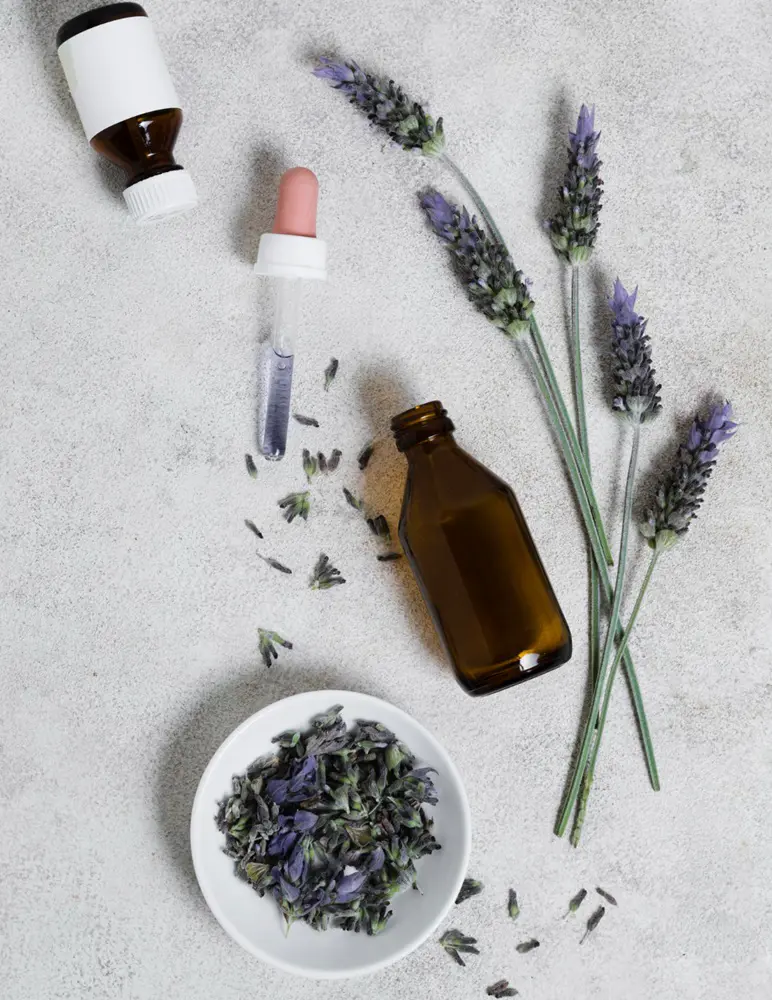Lavender, a versatile and fragrant herb, offers numerous health and wellness benefits. From stress relief and improved sleep to skincare and cognitive enhancement, lavender's uses are vast and varied.
This article explores the benefits of lavender, highlighting how this natural remedy can enhance your daily life.
Whether used in aromatherapy, topical applications, or even culinary dishes, lavender provides a natural, effective solution for many common health issues and promotes overall well-being.
Benefits Of Lavender
Lavender, celebrated for its enchanting fragrance and striking purple blooms, is much more than a pretty plant. Its wide-ranging benefits and uses make it a cherished addition to households and health routines worldwide.
From promoting relaxation to enhancing culinary delights, lavender's versatility is impressive. Here are 15 notable benefits of lavender and its uses:
1. Stress Relief and Relaxation:
Lavender essential oil is renowned for its calming properties. Diffusing lavender oil or adding a few drops to a warm bath can significantly reduce stress and anxiety levels.
The soothing scent of lavender promotes a sense of peace and relaxation, making it an excellent natural remedy for unwinding after a long, stressful day. Whether inhaled directly or enjoyed in a bath, lavender's relaxing effects can help create a tranquil atmosphere conducive to mental and emotional well-being.
2. Improved Sleep Quality:
Lavender's soothing aroma is widely used to improve sleep quality. Placing a lavender sachet under your pillow or using a lavender-scented linen spray can help you fall asleep more quickly and enjoy a deeper, more restful sleep.
The calming properties of lavender can reduce insomnia and enhance overall sleep patterns, making it easier to wake up feeling refreshed and energized. Incorporating lavender into your nightly routine can be a simple yet effective way to enhance your sleep environment.
3. Skin Care:

Lavender oil is highly valued for its antiseptic and anti-inflammatory properties, making it ideal for skin care. It can be used to treat minor burns, cuts, and insect bites, promoting faster healing and reducing discomfort.
Additionally, lavender oil can soothe conditions like eczema and acne, helping to calm irritated skin and prevent breakouts. Its gentle nature makes it suitable for a variety of skin types, providing a natural solution for maintaining healthy and clear skin.
4. Pain Relief:
When diluted and used as a massage oil, lavender can provide significant relief from sore muscles and joint pain. Its natural analgesic properties make it an effective remedy for reducing discomfort and promoting relaxation.
By massaging lavender oil into the affected areas, you can alleviate tension and improve circulation, which aids in the healing process. This makes lavender an excellent choice for those seeking a natural alternative for pain management and muscle recovery.
5. Headache Relief:
Lavender oil is an effective remedy for headaches and migraines. Inhaling its soothing aroma or applying it to the temples can help reduce the severity and duration of headaches.
The calming effects of lavender can relieve tension and stress, which are common triggers for headaches. This natural approach provides a gentle yet effective solution for managing headache pain without the need for medication.
6. Anti-Anxiety and Depression:
Lavender oil has been shown to alleviate symptoms of anxiety and depression, offering a natural alternative or complement to traditional treatments. Inhalation and diffusion of lavender oil can help calm the mind and reduce feelings of anxiety and stress.
Regular use can promote emotional balance and improve overall mental health, making it a valuable tool in managing mood disorders and enhancing well-being.
7. Respiratory Health:
Inhaling steam infused with lavender oil can provide relief from respiratory issues such as colds, flu, and bronchitis. Lavender oil helps reduce inflammation and promote easier breathing, making it an effective remedy for respiratory congestion.
By adding a few drops of lavender oil to a bowl of hot water and inhaling the steam, you can soothe irritated airways and support respiratory health naturally.
8. Digestive Health:
Drinking lavender tea can help soothe digestive issues such as nausea, vomiting, intestinal gas, and upset stomach. The calming effects of lavender can relax the digestive tract and reduce discomfort, promoting better digestion.
Incorporating lavender tea into your routine can provide a gentle and natural way to support digestive health and alleviate common digestive problems.
9. Hair Care:

Lavender oil is beneficial for promoting hair growth, reducing dandruff, and improving scalp health. Adding a few drops of lavender oil to your shampoo or creating a scalp treatment can yield significant benefits.
The antimicrobial properties of lavender oil can help keep the scalp clean and free from infections, while its soothing effects can reduce scalp irritation and promote healthier hair growth.
10. Antioxidant Protection:
Lavender is rich in antioxidants, which help protect the body from free radicals and reduce the risk of chronic diseases. Incorporating lavender into your diet, whether through tea or culinary uses, can provide these protective benefits.
Antioxidants play a crucial role in maintaining overall health and preventing cellular damage, making lavender a valuable addition to a health-conscious lifestyle.
11. Anti-Inflammatory Properties:
Applying lavender oil to inflamed areas can reduce swelling and pain, making it useful for conditions like arthritis. The anti-inflammatory properties of lavender help soothe and calm inflamed tissues, providing relief from discomfort.
Regular application can help manage chronic inflammation and improve mobility, offering a natural approach to pain management and inflammation reduction.
12. Menstrual Pain Relief:
Lavender's analgesic and anti-spasmodic properties make it effective in reducing menstrual cramps. Using lavender oil in aromatherapy or massaging it onto the lower abdomen can alleviate pain and discomfort associated with menstruation.
The calming effects of lavender can also help reduce stress and tension, providing a holistic approach to managing menstrual symptoms.
13. Immune System Support:
Regular use of lavender oil can enhance immune function by reducing stress, which in turn supports overall health. Stress negatively impacts the immune system, and lavender's calming effects can help mitigate this.
Incorporating lavender oil into your daily routine through aromatherapy can boost your body's natural defenses and promote better overall health.
14. Insect Repellent:
Lavender oil acts as a natural insect repellent, effectively keeping mosquitoes and other pests at bay. Applying it to the skin or using it in a diffuser can provide protection from insect bites.
Lavender's pleasant scent makes it a preferable alternative to chemical repellents, offering a safe and natural way to enjoy the outdoors without being bothered by insects.
15. Cognitive Function Enhancement:

Lavender oil can enhance cognitive function and improve mental clarity. Inhaling the aroma of lavender has been shown to increase concentration, boost memory retention, and reduce mental fatigue.
Using lavender essential oil in a diffuser while studying or working can create an environment conducive to better focus and productivity. This natural approach to cognitive enhancement can support mental performance and overall brain health.
Things To Remember While Using Lavender For Health Benefits
When using lavender for health benefits, it's important to keep a few key considerations in mind to ensure safety and effectiveness. Here are some essential points to remember:
1. Quality of Lavender Products
- Use High-Quality Products: Always choose high-quality lavender essential oil or products from reputable sources. Look for labels that indicate the product is 100% pure and organic.
- Check for Additives: Ensure that the lavender oil or products do not contain harmful additives or synthetic ingredients that could diminish its benefits or cause adverse reactions.
2. Dilution is Key
- Essential Oil Usage: Lavender essential oil should always be diluted with a carrier oil (like coconut, almond, or jojoba oil) before applying it to the skin to prevent irritation or allergic reactions.
- Proper Ratios: A general guideline is to use 3-5 drops of essential oil per teaspoon of carrier oil for adults. For children, elderly, or those with sensitive skin, use fewer drops.
3. Patch Testing
- Perform a Patch Test: Before using lavender oil on a larger area of the skin, perform a patch test by applying a small amount to a patch of skin and waiting 24 hours to check for any adverse reactions.
4. Usage Moderation
- Avoid Overuse: Even natural products like lavender should be used in moderation. Excessive use can lead to skin sensitization or other health issues.
- Follow Recommended Dosages: Stick to recommended dosages and usage instructions for both topical and internal uses to avoid potential side effects.
5. Potential Allergies
- Be Aware of Allergies: Some individuals may be allergic to lavender. If you experience any signs of an allergic reaction, such as rash, itching, or difficulty breathing, discontinue use immediately and seek medical advice.
6. Consultation with Healthcare Providers
- Seek Professional Advice: Consult with a healthcare provider, especially if you are pregnant, nursing, have a medical condition, or are taking medication, to ensure that lavender use is safe for you.
7. Children and Pets

- Special Care for Children: Lavender oil should be used with caution on children and always in lower concentrations. Consult with a pediatrician before using essential oils on children.
- Pet Safety: Lavender is generally safe for pets, but it's crucial to use it in moderation and consult with a veterinarian, as pets can be more sensitive to essential oils.
8. Internal Use
- Caution with Ingestion: Only ingest lavender products that are specifically labeled for internal use and consult with a healthcare provider beforehand. Misuse can lead to serious health issues.
9. Proper Storage
- Store Correctly: Store lavender oil and products in a cool, dark place to maintain their potency and extend their shelf life. Ensure they are kept out of reach of children and pets.
10. Awareness of Drug Interactions
- Check for Interactions: Lavender can interact with certain medications, particularly sedatives and CNS depressants. Always consult with a healthcare provider if you are on medication to avoid adverse interactions.
By adhering to these guidelines, you can safely enjoy the numerous health benefits of lavender while minimizing the risk of adverse effects. Lavender's versatility makes it a valuable addition to your health and wellness routine, but it is important to use it responsibly.
FAQs
1. Can Lavender Essential Oil Be Applied Directly to the Skin?
It is generally recommended to dilute the lavender essential oil with a carrier oil (such as coconut, almond, or jojoba oil) before applying it to the skin to prevent irritation or allergic reactions. A typical dilution ratio is 3-5 drops of essential oil per teaspoon of carrier oil for adults.
2. Is Lavender Safe to Use During Pregnancy?
While lavender is considered one of the safer essential oils for use during pregnancy, it is crucial to consult with a healthcare provider before using it. Some healthcare professionals advise avoiding essential oils during the first trimester. Always use diluted oils and limit usage to ensure safety.
3. How Can Lavender Be Used to Improve Sleep?
Lavender can be used in various ways to improve sleep quality. Common methods include diffusing lavender essential oil in your bedroom, adding a few drops to a warm bath before bed, or using lavender-scented pillow sprays. Inhaling lavender's soothing aroma can help relax the mind and body, promoting better sleep.
4. Can Lavender Essential Oil Be Ingested?
Ingesting lavender essential oil is generally not recommended unless it is a food-grade product specifically labeled for internal use and under the guidance of a healthcare provider. Misuse of essential oils can lead to serious health issues. Instead, consider using dried lavender or lavender tea for culinary purposes.
5. Are There Any Side Effects Associated with Using Lavender?
While lavender is generally safe for most people, some may experience side effects such as skin irritation, allergic reactions, or gastrointestinal discomfort when ingested. Overuse of lavender, especially essential oil, can lead to headaches and increased heart rate. Always use lavender in moderation and discontinue use if adverse reactions occur.
6. How Can Lavender Be Used for Pain Relief?
Lavender can be used for pain relief through topical application and aromatherapy. For topical use, dilute lavender essential oil with a carrier oil and massage it into sore muscles or joints. For headaches, apply diluted oil to the temples or inhale the aroma. Its analgesic and anti-inflammatory properties help alleviate pain and discomfort.







